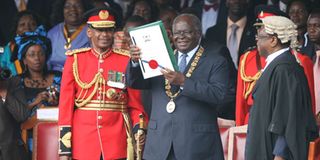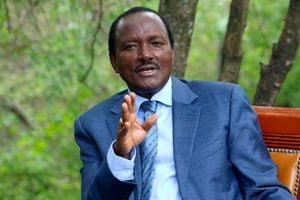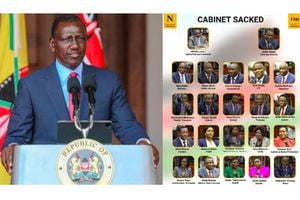
Raila Odinga.
A worried Ms Martha Karua made a frantic call to Mr Moody Awori, a senior figure in the opposition National Rainbow Coalition (Narc) that formed the government in 2003.
Ms Karua was worried that a simmering power struggle was unfolding away from the eyes of Kenyans, who were still in an ecstatic mood after Narc ousted the authoritarian Kanu from power after 40 years.
A disagreement between President Mwai Kibaki and Mr Raila Odinga over the formation of the cabinet, as agreed before the elections, dampened the celebrations just days after the landmark victory in the December 2002 polls.
“Right from day one, on the appointment of cabinet, there was a disagreement between Raila and Kibaki despite coming to power as a united entity,” Ms Karua, who had a front-row seat to the unfolding power play in the new administration, recalled in a recent interview.

Then President Mwai Kibaki shakes hands with ODM Raila Odinga at Harambee House in Nairobi in 2008.
“We didn't know exactly over which names (they were disagreeing on) and I remember calling Uncle Moody to ask him, ‘Why can't they sit down and sort out underlying issues?’” Ms Karua said, referring to the Narc Summit member who went on to serve as a cabinet minister and later as President Kibaki's vice president.
Ms Karua, who later became a cabinet minister, recalled their conversation: "We are in such a happy mood as a country. Why is this happening after we fought so hard to win?"
Ms Karua said the situation deteriorated to the extent that Mr Odinga, who had led the defection of senior Kanu politicians to the opposition camp, was locked out of State House by President Kibaki's associates.
“I even called President Kibaki and he took my call. I asked him, ‘Why do I hear reports that Raila has been denied access to State House to see you?’ And he just told me to ask him (Raila) to call. I thought that was the end of the matter, but I don't know how it progressed after that,” the Narc Kenya leader said in an interview at her party offices in Nairobi.

Azimio la Umoja One Kenyaleader Raila Odinga with his 2022 running mate Martha Karua during their final rally at Kasarani stadium on August 6, 2022. The two leaders have differed over the return of Azimio demos.
Two decades later, Ms Karua became Mr Odinga’s running mate in the 2022 presidential election, which they narrowly lost to Dr William Ruto and Mr Rigathi Gachagua.
But President Ruto and his deputy's political dalliance appears to have been short-lived as the two have been locked in a noisy spat barely two years into their tenure, with Mr Gachagua accusing the President and his inner circle of sidelining him from power.
The head of state is facing an internal revolt from his deputy in a situation that mirrors the constant feud between him (Dr Ruto) and his predecessor, Uhuru Kenyatta, between 2018 and 2022.
Ironically, Dr Ruto blamed Mr Odinga for rocking the boat of the ruling Jubilee party.
Deputy President Gachagua has been absent from key presidential engagements, including a crucial security meeting and his subsequent televised address following a bloody uprising by youths who stormed parliament to protest a raft of new taxes.
Back to the Narc fiasco, Ms Karua revealed that she had relayed the information from Mr Kibaki asking Mr Odinga to call him.
She felt it was an unfortunate incident probably perpetrated by some in Kibaki's 'kitchen cabinet'.
“I was not in the Kitchen Cabinet. You must know, if you go back to history, that in 1998, Kibaki had done a shadow cabinet and named me Minister of Culture and Social Services and I publicly rejected it,” she explained.
“I don't think Kibaki carried over a grudge. But certain people around him felt that it was disrespectful of me. You know, some people are not democrats in their heads. They think if you are given something, you must take it. I rejected it. I also differed with Kibaki on how he had handled me,” Ms Karua added.
Mr Musikari Kombo, who also served as Local Government Minister in the Narc government, also recalled how reneging on the Memorandum of Understanding (Mou) to appoint Mr Odinga as Prime Minister led to the feud in the Narc government.
“There was that MoU, but unfortunately after we won in 2002, some of our colleagues convinced Kibaki that it was not necessary to create the position of Prime Minister, as that was not in the constitution. They said there was no way Kibaki could share power, so that agreement was swept aside, creating disharmony in government,” Mr Kombo said.
After Narc’s triumph in the 2002 elections, Kenyans were so hopeful about the new administration that, in 2003, they were voted as the most optimistic in the world.
The victory wasn’t easy, especially with last-minute jinxes.
Mr Kibaki’s National Alliance of Kenya (NAK) and Mr Odinga’s Liberal Democratic Party (LDP), among other parties, had to haggle over the joint opposition candidate.
Just days before the election, Mr Kibaki was involved in an accident and had to be taken to a London hospital for treatment.
Mr Odinga had to take charge of the opposition campaign.
Mr Kibaki later triumphed over former President Moi's preferred successor, Uhuru Kenyatta. President Kibaki won 62 per cent of the vote and Narc also won 59 per cent of parliamentary seats.
But the behind-the-scenes power struggle over the controversial MoU threatened the nascent Narc administration even before the new power brokers had settled into office.
Some of the key provisions of the MoU were the 50-50 division of positions in the government and the creation of the post of Prime Minister, which was to go to Mr Odinga after Mr Kijana Wamalwa became Vice-President.
In his 23-member cabinet, Mr Kibaki appointed 15 ministers from his NAK wing and gave the LDP eight slots, some of whom were not nominated by Mr Odinga's camp.
This broken promise would sow the seeds of discord and a full-blown crisis would engulf the NAK government in 2005 when Mr Odinga led renegade ministers in a campaign against a draft constitution championed by President Kibaki.
During the drafting of the Constitution, there was disagreement over how much power should be vested in the president.

The late President Mwai Kibaki during the promulgation of the Constitution on August 27, 2010.
In earlier drafts, Mr Odinga's camp, which opposed an imperial presidency, had supported provisions for power-sharing between the president and the prime minister.
But the final draft of the constitution, which was put to a referendum in 2005, retained sweeping powers for the head of state.
The referendum split the ruling Narc into camps for and against the proposal, and sparked violence between Orange (No) and Banana (Yes) supporters.
“In the end, Raila’s group won and the constitution was rejected at the ballot,” Mr Kombo recalled.
This forced President Kibaki to sack his entire Cabinet, a day after Kenyans rejected the constitution he had championed.
“Following the results of the referendum, it has become necessary for me, as the President of the Republic, to reorganise my government to make it more cohesive and better able to serve the people of Kenya,” President Kibaki announced then.
“I have directed that the offices of all ministers and all assistant ministers become vacant. Consequently, the occupants of the said offices cease to hold their respective offices with immediate effect,” he said.
Mr Kombo revealed that he had been involved in advising Mr Kibaki to push for the resignation of all ministers as a result of the major disagreement over the referendum.
“I told him, ‘Look, if the cabinet is split in the way it is, how are you going to run this cabinet? The best thing is for us all to resign from the cabinet, and then you can form a new cabinet'.
“He took my advice, and he formed a new cabinet. That was a very unfortunate period. I think if we had remained united as Narc, the country would have moved forward even better,” he said.
He explained that the unfortunate events soon after Narc came to power were the result of "an observation that a person's sense of morality diminishes as his or her power increases".
"Power corrupts, but absolute power corrupts absolutely," Mr Kombo quipped, referring to an observation by British historian Lord Acton.
He said: “Some of my colleagues at the time, and I'm not going to name names, saw the power and decided that they could not share it with anybody, and so this unwritten agreement (MoU) was torn to pieces, and it led to us splitting.”
The split would later lead to the creation of the Orange Democratic Movement (ODM) party, which gave Mr Kibaki a run for his money in the 2007 general election. The disputed 2007 election led to post-election violence that claimed the lives of at least 1,000 Kenyans and displaced more than 600,000 others.
President Kibaki and his main challenger Raila Odinga were forced to share power in a grand coalition government.
The subsequent 2013 elections saw a surprise pre-election deal between Uhuru Kenyatta of The National Alliance and William Ruto's United Republican Party.

President Uhuru Kenyatta and his deputy William Ruto acknowledges their supporters along Outering road in Nairobi on October 9, 2014 after the president jetted back from Hague, Netherlands where he attended the ICC status conference.
The duo, who were battling International Criminal Court indictments stemming from the 2007 post-election violence, mobilised support on an anti-ICC ticket.
They swept to power, beating Mr Odinga and his running mate Kalonzo Musyoka, a victory they repeated after the 2017 election.
President Kenyatta, who reached out to opposition leader Mr Odinga after the 2017 poll crisis, later fell out with his deputy, Dr Ruto, for much of his second term.
Dr Ruto later defeated President Kenyatta's preferred successor, Mr Odinga, in the 2022 elections, which saw Mr Gachagua elected as his deputy.
History is repeating itself again as President Ruto and his deputy feud, with Mr Gachagua sensationally attacking intelligence chief Noordin Haji.







